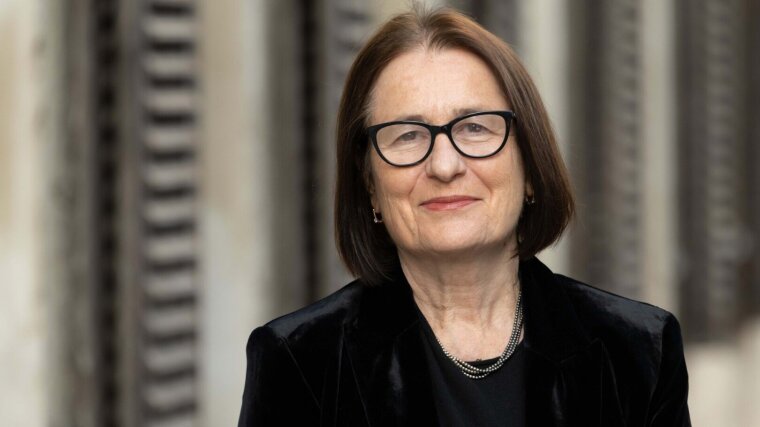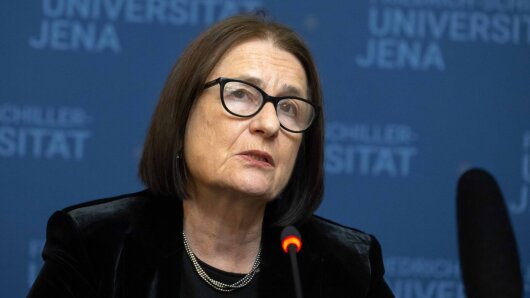
Irina Shcherbakova is the co-founder of the Russian human rights organization known as »Memorial«. The NGO, which was awarded the Nobel Peace Prize in 2022, has by now been liquidated and expropriated by the Russian state. The historian and human rights activist has joined hundreds of thousands of others in turning their backs on Russia and is currently living in exile in Thuringia. This is the portrait of a woman fighting tirelessly for the rights of the disenfranchised.
By Ute Schönfelder
It's a Thursday morning in November 2022. Irina Shcherbakova is sitting in her apartment in Weimar, which has been her home for almost six months now and recalls what happened on 7 October 2022. »I was sitting here giving a video interview, just like I am now, when a Russian news tab popped up. The online portal called ›Meduza‹ reported that the Nobel Peace Prize had been awarded to Memorial, among others«. She admits that it hadn't even dawned on her that it was the first Friday in October - the day on which the laureates are announced by the Norwegian Nobel Committee.
Memorial, the human rights organization co-founded by Irina Shcherbakova in the Soviet Union over 30 years ago, had been nominated for the award on several occasions. The NGO had already received numerous other honours, including the Right Livelihood Award in 2004. »The fact that we've been awarded the Nobel Peace Prize at this difficult time is a great endorsement and recognition of our work. It's reassuring to know the past 30 years haven't been in vain in the eyes of the global community. And it motivates us to continue our efforts - even under the current circumstances«.
When she thinks back to that day, she was mainly concerned about the circumstances in Moscow. »At the time of the announcement, my colleagues were sitting in a courtroom. That was the day our premises were illegally seized by the state. It made the whole situation pretty absurd«. Memorial International had been dissolved by the Russian government at the end of 2021, and this was finally confirmed by the Supreme Court of the Russian Federation in February 2022. In spite of this tremendous challenge, Irina Shcherbakova and her fellow campaigners have not remained idle for a day and continue their work in dozens of international and regional Memorial organizations in Russia and the rest of the world.
Shcherbakova recalls that the Nobel Prize announcement was immediately followed by a string of »turbulent« weeks full of interviews, lectures, television appearances, the Marion Dönhoff Prize for International Communication and Reconciliation, a speech delivered to the EU Parliament, and tireless work to fight injustice in her homeland. At the University of Jena, she gave a moving speech during the welcoming ceremony for new students at the start of the winter semester.
As if on cue, Shcherbakova's phone rings. She takes the call with a curt response: »I can't talk right now«. Then she switches off her phone and says apologetically: »It's like that all the time«.
Family history shaped by Stalinist terror
Irina Shcherbakova was born in Moscow in 1949 - »still during the Stalinist era,« as she points out. She comes from a family of Jewish communists. In the 1920s and 30s, her grandfather worked as a functionary in Lenin's »Communist International« (»Comintern«). Her mother grew up in Moscow's famous »Hotel Lux«, which served as a guest house for the Comintern, accommodating numerous political émigrés in the 1930s - many of whom were from Germany.
»The atmosphere was highly political. Most of my grandfather's friends and colleagues fell victim to the great Stalinist terror of the 1930s«. Irina Shcherbakova's childhood and youth were shaped by the experiences of her parents and grandparents. Her father was a literary scholar who published a journal on literature.
»Literature was his way of enlightening people about what happened during the Stalinist era,« she says. In the post-Stalinist era of the 1950s, this could usually only be done in secret; many books recounting the horrific details of terror and the Gulag were self-published and banned. Up until the period of de-Stalinization that occurred during the »Khrushchev Thaw« in the 1960s, when the everyday life of a Gulag prisoner was first portrayed in Aleksandr Solzhenitsyn's novella entitled »One Day in the Life of Ivan Denisovich«, very little had been published on the subject at all.
This type of literature would ultimately be Irina Shcherbakova's gateway to history and her professional career. »I actually wanted to study history, but not the ideologized courses offered at the time«, she recalls. So, she opted for German Studies instead. After graduating and obtaining a doctorate from Moscow State University, she first worked as a translator of German fiction and as a journalist and editor for literary magazines.
In the late 1970s, Irina Shcherbakova started to conduct secret interviews with Gulag survivors and recorded their conversations on tape. »At the time, those people were the only source available on the Gulag system. All official traces had been scrubbed away, and the archives were firmly locked«, she says. It was important to her that the victims of political persecution weren't forgotten; she wanted to aid their rehabilitation by giving them the opportunity to speak openly about what they had been through. Up until the 1990s, Irina Shcherbakova recorded around 100 interviews with contemporary witnesses, gradually revealing the sheer magnitude of Stalinist repression and injustice.
Mikhail Gorbachev's time as the leader of the Soviet party and head of state saw the emergence of the »glasnost« and »perestroika« policies, which sparked a major movement that affected millions of people in the Soviet Union and ultimately led to the establishment of the human rights organization »Memorial« in 1988. Irina Shcherbakova was one of its founding members; the dissident and Nobel Peace Prize laureate Andrei Sakharov served as the first chairman.
While researching the Soviet camp system in the late 1980s, she stumbled upon the history of Buchenwald Special Camp Number 2. The Soviet occupation forces kept German prisoners on the site of the former Nazi concentration camp between 1945 and 1950. In addition to Buchenwald, there were nine other camps in the Soviet Occupation Zone, in which a total of around 150,000 people were interned.
Irina Shcherbakova then coordinated a research project to delve into the history of the special camps together with historians from the FernUniversität Hagen, who were joined by members of the University of Jena such as Lutz Niethammer and Volkhard Knigge. This is when she started to develop close ties to Thuringia.
Long-standing academic contacts in Thuringia
This was followed by numerous other joint projects, including the »Traces of the Gulag« exhibition by Memorial and the Buchenwald and Mittelbau-Dora Memorials Foundation, which was shown in Buchenwald and other parts of Germany under the direction of Shcherbakova and Knigge. Since the early 2000s, she has been collaborating with Norbert Frei and the Jena Centre for 20th Century History at the University of Jena, where she was a visiting professor in the 2008/09 winter semester. Since 1999, Shcherbakova has also been a member of the Academic Advisory Board for the Buchenwald and Mittelbau-Dora Memorials Foundation.
This close relationship to Weimar and Jena is one of the main reasons why Irina Shcherbakova now lives in Thuringia. »Even immediately before the Russian attack on Ukraine in February, I never expected to leave my homeland,« she says today. But as the reprisals against Memorial and its members grew, she started to fear that it might not be possible for her to leave the country at some point in the future.
And so, like hundreds of thousands of her compatriots, she and her husband turned their backs on Russia in March. After spending a few months in Tel Aviv, she moved to Weimar in the summer of 2022. Since the start of the winter semester, she has also found her academic home in Thuringia as a visiting professor at the Imre Kertész Kolleg at the University of Jena.
